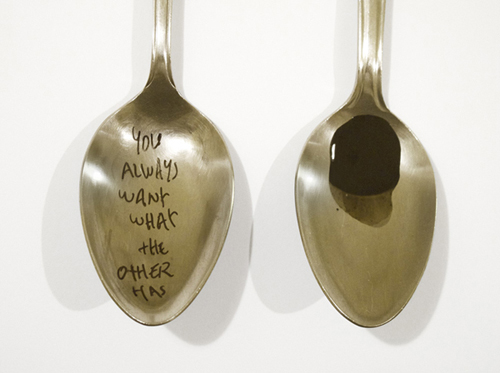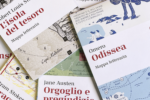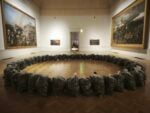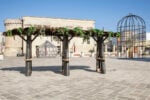Pascal Hachem – You Always Want What The Other Has (Edition 2013)

Attraverso la manipolazione di oggetti di uso comune, l’artista affronta le idee di appropriazione e monopolizzazione, argomenti di estrema contingenza e attualità.
Comunicato stampa
Federica Schiavo Gallery is thrilled to announce Pascal Hachem’s second solo exhibition in Rome titled You Always Want What The Other Has (Edition 2013). The new body of sculptures, created through the manipulation of ordinary objects, refers to ideas of ‘stealing’ – ‘monopolization’ in our everyday life – which is a very strong topic nowadays as we steal everything, from immaterial properties to land.
This desire of ‘obtaining’ captures anything we do in life. It is an endless yearn for possession that does not come from real needs. The human being is continuously creating images of desire in order to manipulate and instill to other people a keen sense of lacking confidence. This is why any action of owning should serve to bridge this gap.
“Planet Earth is generous and everyone has a place on it!”. According to Hachem’s philosophy we should not own things, but it is rather a matter of taking and giving. We could simply share and build everything on the basis of these criteria. We don’t need to define a place to us, we don’t need to trace a limit and put a frontier to protect our land. This exhibition takes into consideration the nature of these problems caused by the fact that everyone wants what the other has. ‘Everyone’ does not exclude the artist as he is playing the same game and cannot avoid the question.
The common expression “to put hands on” (in French “main mise”) has its roots into desire of wanting something. Through different ways and tools, this desire becomes an obsession of enlarging the territory of power even if it might lead to killing, provoking wars or doing something bad to others!
Although the use of ‘force’ can provide man with many things, every time he does something for himself he actually becomes like a tool for his competitor without being conscious of it.
"How many things would you like to owe?" The artist answer on the behalf of all of us provocatively: “I want almost everything on Earth and I don’t care if this means that you will live a miserable life! I only care about having more and I’ll never get enough! I just want to put my hands on your land, draining energy from the whole planet, using nuclear for my power sake and twisting the other lives upside-down. I actually don’t care if you slept without eating yesterday! I care for myself!”
Hachem’s work is always inspired by the everyday life and he tends to contextualise his way of thinking with the social and political situations in Beirut. His practice is influenced by an unconscious way that he cannot escape. The artist does not impose any set of rules upon himself, but rather he is prompted by nothing but a single impressionable moment, to produce. As a result, he has a varied catalogue of work using various mediums, including his own body and common objects.
PASCAL HACHEM was born in Beirut, Lebanon in 1979, where he currently lives and works.
He graduated in Spatial Design in 2002 and he teaches Design at the American University of Beirut and the Lebanese American University in Beirut.
Selected Solo Shows: You Always Want What The Other Has (Edition 2013), Federica Schiavo Gallery, Rome, Italy 2013; Beliefs In Self-Deception, Selma Feriani Gallery, London, UK 2013; Public Spaces = A Place for Action, Bcharre, Lebanon 2013 (installation in collaboration with Rana Haddad); in.nate.ness, Federica Schiavo Gallery and Cestia Pyramid, Rome, Italy 2010; Bring The Boys Back Home, Selma Feriani Gallery, London, UK 2010; X Wohnungen, International Istanbul Theatre Festival, Istanbul, Turkey 2008 and Festival Belluard Bollwerk International, Fribourg, Switzerland 2007. Selected Group Shows: Crisis Practice, Workshop Gallery, Beirut, Lebanon 2013; Mediterraneo: incontri o conflitti?, Palazzo Gargasole, Gagliano del Capo, Lecce, Italy 2012; Chkoun Ahna, Carthage Museum, Tunis, Tunisia 2012; The Third Eye, Selma Feriani Gallery, London, UK 2009; Hopes and Doubts, Fondazione Merz, Turin, Italy 2009 and Cinema City, Beirut, Lebanon 2008; A Place I Know Well, PROGR, Bern, Switzerland 2008; Fabrica: Les Yeux Ouverts, Notebook project, Triennial of Milan, Italy 2007 and Centre Pompidou, Paris, France 2006. Awards: Première Place en Sculpture, VIIe édition des Jeux de la Francophonie, Nice, France 2013; Art and Dialogue Between the Cultures of the East and the West, The Boghossian Foundation, Beirut, Lebanon 2012.
His first monographic catalogue, titled Pascal Hachem – Beirut 2012, has been published and produced in 2012 by Federica Schiavo Gallery, Rome and Selma Feriani Gallery, London.
For further information: +39 (0)6 45432028 or [email protected]
www.federicaschiavo.com
FEDERICA SCHIAVO GALLERY IS ALSO GLAD TO SHARE THE OPENING DAY WITH:
Furini Art Contemporanea | IMAGE/OBJECT | curated by Tim Ellis
Pio Abad, Tim Ellis, Luey Graves, Ian Monroe, Rupert Norfolk, Mark Pearson, Sam Plagerson
27 September - 15 November 2013 | www.furiniartecontemporanea.it
OPENING, VENERDI’ 27 SETTEMBRE 2013 H 19.00 - 21.00
28 SETTEMBRE – 7 DICEMBRE 2013
FEDERICA SCHIAVO GALLERY
PIAZZA MONTEVECCHIO 16 ROMA
Federica Schiavo Gallery è lieta di annunciare la seconda personale a Roma dell’artista libanese Pascal Hachem, dal titolo You Always Want What The Other Has (Edition 2013).
Attraverso la manipolazione di oggetti di uso comune, l’artista affronta le idee di appropriazione e monopolizzazione, argomenti di estrema contingenza e attualità. La brama sconfinata di possesso, non traendo origine da bisogni reali, spinge l’uomo a creare continue immagini di desiderio per manipolare i propri simili e instillare in loro un profondo senso di sfiducia in se stessi. Ogni azione di possesso servirebbe dunque a colmare, temporaneamente, tale inadeguatezza.
“Il Pianeta Terra – secondo Hachem – è generoso e ognuno di noi trova posto in esso!”. Secondo questa idea non avremmo alcun bisogno di possedere gli oggetti, ma si tratterebbe piuttosto di una questione di dare e prendere. Sulla base di questi criteri potremmo semplicemente costruire e condividere l’un l’altro qualsiasi cosa. Non abbiamo necessità di definire un nostro posto, non serve tracciare un limite ed erigere una frontiera per proteggere la nostra terra.
Questa mostra prende in considerazione la natura del problema legato al fatto che ognuno di noi vuole ciò che ha l’altro. Nel pronome ognuno è incluso anche l’artista, il quale gioca la nostra stessa partita e non può evadere la questione.
L’espressione comune “mettere le mani su” (in francese “main mise”) ha radici nell’impulso volitivo diretto a qualcosa. Tale desiderio, alimentato attraverso modi e strumenti diversi, si fa ossessione per il potere e per la sua estensione senza limiti, persino se ciò dovesse condurre all’assassinio, allo scoppio di guerre o semplicemente provocare qualcosa di terribile agli altri. Sebbene l’utilizzo della ‘forza’ sia in grado di fornire all’uomo innumerevoli cose, in realtà questi diventa a sua volta, del tutto inconsciamente, uno strumento nelle mani del proprio avversario.
“Quante cose ti piacerebbe possedere?” L’artista risponde affermando provocatoriamente: “Voglio praticamente tutto ciò che è sulla Terra e non mi importa se questo obiettivo comporti per voi una vita miserabile! Mi interessa solamente avere di più e non ne avrò mai abbastanza! Voglio mettere le mie mani sulla tua terra, succhiare ogni energia del pianeta, utilizzare il nucleare in ragione del mio potere e mettere sottosopra le vite degli altri. In verità me ne frego se hai dormito senza cena ieri! Voglio bene a me stesso!”
Il lavoro di Pascal Hachem prende spesso ispirazione dalla vita di tutti i giorni. L’artista tende a contestualizzare il proprio modo di pensare in relazione alle condizione sociali e politiche di Beirut. La sua pratica artistica è influenzata da una modalità inconscia che egli stesso non può evadere. Hachem non si impone alcuna regola, piuttosto è spinto all’azione da null’altro che un singolo impressionabile momento, da riprodurre. Il risultato è un catalogo di vari lavori sviluppati attraverso l’utilizzo di mezzi disparati tra cui oggetti comuni e il suo stesso corpo.
PASCAL HACHEM è nato a Beirut, Libano nel 1979, dove attualmente vive e lavora. Si è laureato in Spatial Design nel 2002 e insegna Design alla American University di Beirut e alla Lebanese American University di Beirut.
Selezione mostre personali: You Always Want What The Other Has (Edition 2013), Federica Schiavo Gallery, Roma 2013; Beliefs In Self-Deception, Selma Feriani Gallery, Londra 2013; Public Spaces = A Place for Action, Bcharre, Libano 2013 (installazione in collaborazione con Rana Haddad); in.nate.ness, Federica Schiavo Gallery e Piramide Cestia, Roma 2010; Bring the Boys Back Home, Selma Feriani Gallery, Londra 2010; X Wohnungen, International Istanbul Theatre Festival, Istanbul 2008 e Festival Belluard Bollwerk International, Friburgo, Svizzera 2007. Selezione mostre collettive: Crisis Practice, Workshop Gallery, Beirut, Libano 2013; Mediterraneo: incontri o conflitti?, Palazzo Gargasole, Gagliano del Capo, Lecce 2012; Chkoun Ahna, Carthage Museum, Tunisi, Tunisia 2012; The Third Eye, Selma Feriani Gallery, Londra 2009; Hopes and Doubts, Fondazione Merz, Torino 2009 e Cinema City, Beirut, Libano 2008; A Place I Know Well, PROGR, Berna, Svizzera 2008; Fabrica: Les Yeux Ouverts, Notebook project, Triennale di Milano, Italy 2007 e Centre Pompidou, Parigi 2006. Premi: Première Place en Sculpture, VIIe édition des Jeux de la Francophonie, Nice, France 2013; Art and Dialogue Between the Cultures of the East and the West, The Boghossian Foundation, Beirut, Libano 2012. La sua prima monografia dal titolo Pascal Hachem – Beirut 2012, è stata pubblicata e prodotta lo scorso anno da Federica Schiavo Gallery, Roma e Selma Feriani Gallery, Londra.



